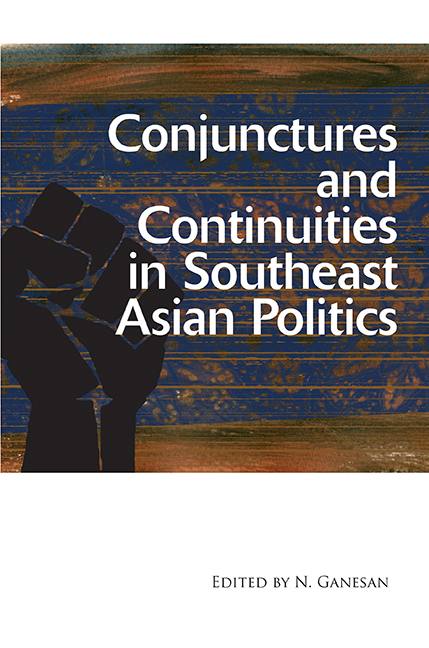Book contents
- Frontmatter
- Contents
- Acknowledgements
- List of Abbreviations
- Contributors
- 1 Conjunctures and Continuities in Southeast Asian Politics
- 2 (Re)Assessing the EDSA “People Power” (1986) as a Critical Conjuncture
- 3 The Road to Doi Moi in 1986: Domestic Dimensions
- 4 The 1988 Uprising in Myanmar: Historical Conjuncture or Praetorian Redux?
- 5 Cambodia's Historical Conjunctures and their Significance
- 6 Changing the Rules: Historical Conjuncture and Transition in Indonesia
- 7 The Resistible Rise of Thaksin Shinawatra: Crisis, Change and the Collapse of Thailand's Democracy
- 8 The March 2008 General Election in Malaysia as a Historical Conjuncture
- 9 Conclusion: Conjunctures and Continuities in Southeast Asia
- Index
1 - Conjunctures and Continuities in Southeast Asian Politics
Published online by Cambridge University Press: 21 October 2015
- Frontmatter
- Contents
- Acknowledgements
- List of Abbreviations
- Contributors
- 1 Conjunctures and Continuities in Southeast Asian Politics
- 2 (Re)Assessing the EDSA “People Power” (1986) as a Critical Conjuncture
- 3 The Road to Doi Moi in 1986: Domestic Dimensions
- 4 The 1988 Uprising in Myanmar: Historical Conjuncture or Praetorian Redux?
- 5 Cambodia's Historical Conjunctures and their Significance
- 6 Changing the Rules: Historical Conjuncture and Transition in Indonesia
- 7 The Resistible Rise of Thaksin Shinawatra: Crisis, Change and the Collapse of Thailand's Democracy
- 8 The March 2008 General Election in Malaysia as a Historical Conjuncture
- 9 Conclusion: Conjunctures and Continuities in Southeast Asia
- Index
Summary
In their evolution of political structures and life, countries often undergo significant conjunctures or what is sometimes referred to as historical junctures. For parsimony, the term conjuncture which appears to better reflect a confluence of forces has been chosen. A conjuncture involves “interaction effects between distinct causal sequences that become joined at particular points in time”. During such moments “relatively long periods of institutional stability and reproduction are punctuated occasionally by brief periods of institutional flux”. At the formative level, such conjunctures are likely to be important starting points in the historical evolution of a society or country. Just like ethnic nations, these formative episodes are likely to involve an important event, declaration or document. The American Civil War in the 1800s and the Magna Carta in the United Kingdom constitute such episodes. Subsequently, and deriving their legitimacy from these formative events, structures, rituals and practices that acquire symbolic and mythical value evolve over time. Whereas such practices naturally undergo changes over time to reflect both the popular will as well as administrative refinements, there is a certain permanence about these foundational norms. For example, in the United Kingdom, as democracy evolved, power gradually shifted from the upper House of Lords to the lower House of Commons. Notwithstanding the changes in the configuration of power between both Houses, it can be argued that the structures have remained intact. In fact, the transfer of power from the Lords to the Commons quite simply reflected the democratic value that state sovereignty should be vested with the citizenry rather than the elite aristocracy.
Foundational conjunctures are likely to determine structural and cultural norms that order political life. Such events typically identify the rules of engagement and provide both opportunities and constraints to regulate politics. Changes then occur incrementally while the basic principles or rules of engagement become reified. However, from time to time states and societies undergo major events that reorder political structures and norms.
- Type
- Chapter
- Information
- Publisher: ISEAS–Yusof Ishak InstitutePrint publication year: 2013



